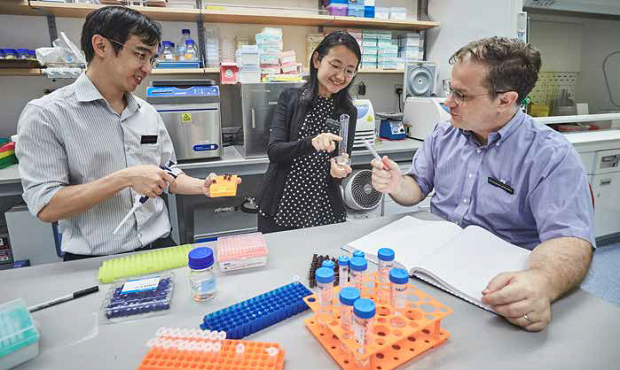
National Heart Centre Singapore researchers have uncovered a link between sarcopenia and the heart, a discovery that could potentially identify elderly individuals at risk of heart disease.
As people age, their muscles gradually weaken, resulting in a medical condition called sarcopenia, or agerelated loss of muscle mass. Individuals with sarcopenia fall frequently, walk slowly and struggle with daily activities such as climbing the stairs. In Singapore, sarcopenia’s prevalence in the population is estimated to be 13 per cent, but significantly higher in older adults, at 30 per cent.
In 2014, a research team led by Associate Professor Angela Koh, Senior Consultant, Department of Cardiology, National Heart Centre Singapore (NHCS), conducted a longitudinal study to understand the link between sarcopenia and the heart.
Explaining the motivation for the study, Assoc Prof Koh said, “While the occurrence of skeletal muscle degeneration with ageing is known, the impact of sarcopenia on the ageing heart has not been identified.” Skeletal muscles are muscles attached to the bones that help individuals to move; they also form the bulk of our muscles.
The study, known as the Cardiac Ageing Study, analysed 300 people in Singapore aged between 40 and 80 years. The researchers conducted various scans and assessments such as echocardiograms, skeletal muscle measurements and hand grip strength tests. An echocardiogram allows doctors to identify heart problems and determine whether heart problems are causing symptoms like chest pain and shortness of breath.
Skeletal muscle mass, function and heart structure
The five-year study found a strong link between skeletal muscle mass, function and heart structure. In fact, more than 20 per cent of older adults with sarcopenia had smaller hearts than those without sarcopenia, even after the findings were adjusted for age and body size. The team also ruled out other factors that could cause individuals to lose muscle mass, such as hypertension and diabetes, which could affect the study findings. Ultimately, the findings supported the team’s hypothesis that older adults may suffer from a syndrome of cardio-sarcopenia before they develop heart disease symptoms.
Explaining the study findings, Assoc Prof Koh said, “The discovery of this pattern within the heart muscle suggests early development or progression of cardiovascular disease that occur jointly in the heart and skeletal muscle. This provides a window of opportunity to detect this syndrome early on, before heart disease occurs among our aged population.” She added that some skeletal muscle losses may translate to muscle loss in the heart — the way this happens may be similar but more research is required to confirm it.
In the meantime, Assoc Prof Koh shared that exercise is key in maintaining skeletal muscle and heart health. Older adults can incorporate regular resistance exercise in their daily lives as it is known to induce muscle growth. Additionally, they can consume more protein-rich food such as fish, eggs, poultry and dairy products to prevent sarcopenia.
Read more: Muscle loss in seniors (sarcopenia), what foods and exercises can help prevent it? Click here to find out.
Future research
Assoc Prof Koh and her team are following up with their study participants to better understand the cardio-sarcopenia condition. They are also working on preventive strategies to tackle complications of the ageing heart.
Given that studies have shown that exercising promotes healthy ageing of skeletal muscle, they conducted a 12-week specialised exercise programme with 30 participants to find out the effects of the exercise programme in slowing down heart ageing and its benefits to overall health. Assoc Prof Koh aims to publish a report on the findings in a few years’ time.
Assoc Prof Koh shared that she and her team are also embarking on deeper studies of biomarkers to understand cardio-sarcopenia beyond clinical correlational studies. Biomarkers are molecules found in blood, body fluids and tissues that indicate whether biological processes are normal or there is disease. “One key biochemical pathway is ‘inflammaging’, a chronic low-grade inflammatory state that has been reported in multi-systemic ageing conditions,” said Assoc Prof Koh. The team will spend the next few years measuring these inflammatory biomarkers in samples taken from older adults with heart ageing.
The Cardiac Ageing Study received support from National Medical Research Council of Singapore, Duke-NUS Medical School and various philanthropic partners.
Get the latest updates about Singapore Health in your mailbox! Click here to subscribe.












